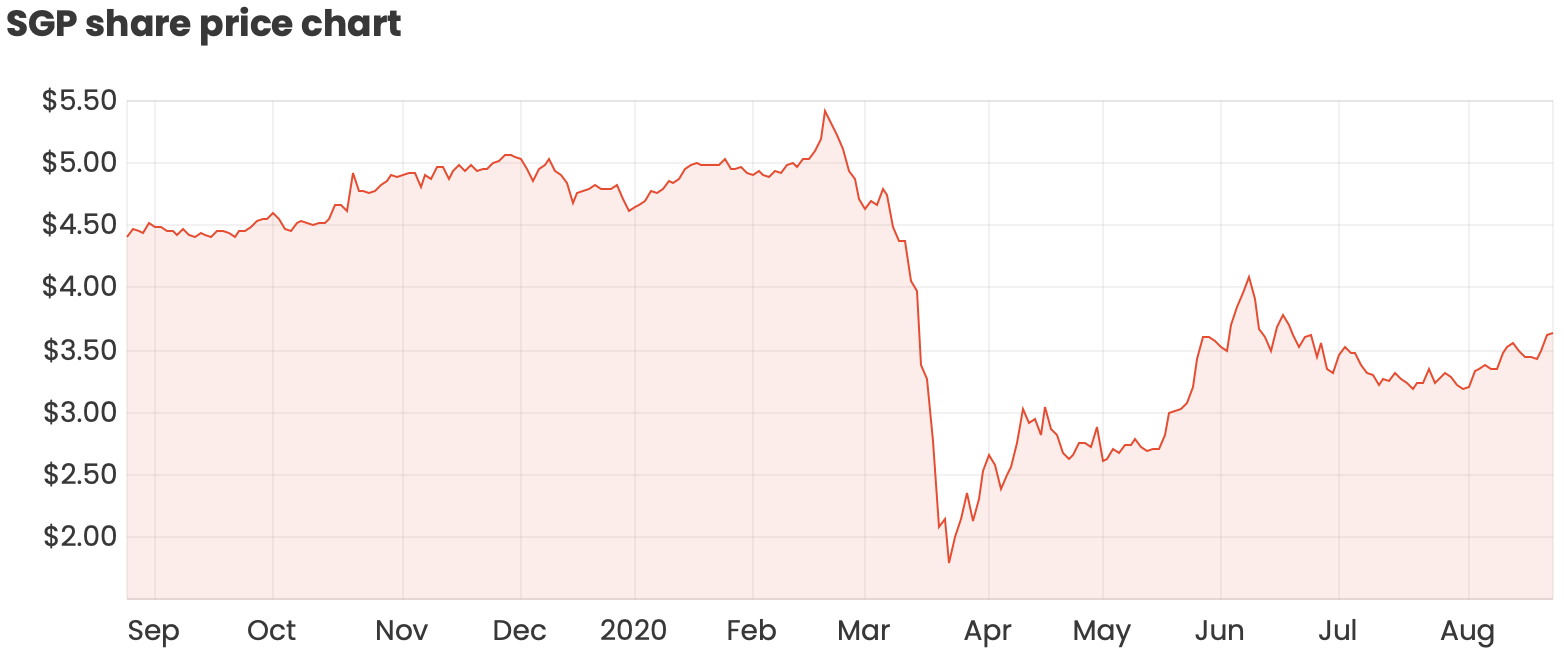So far this month, we’ve heard from ASX property shares like Goodman Group (ASX: GMG), Vicinity Centres (ASX: VCX), Mirvac Group (ASX: SGP), Dexus Property Group (ASX: DXS), and Charter Hall Group (ASX: CHC).
Today, it was Stockland Corporation Ltd (ASX: SGP)’s turn to report, announcing a slight increase in revenue but a swing to a statutory loss.
As you can see in the chart below, it hasn’t been an easy six months for Stockland shares but they’re on the road to recovery, strengthened by a 6% share price rise today.

The 5 key points
- Revenue increased by 1.6% to $2.81 billion
- Funds from operations came in at $825 million, down 8% on FY19 largely due to COVID-19
- Net tangible assets (NTA) decreased 6.7% to $3.77 per security, primarily as a result of property devaluations
- Statutory loss after tax of $14 million, also impacted by property devaluations
- Final distribution of 10.6 cents per security, down 25% compared to FY19
Unpacking Stockland’s FY20 report
Commenting on the results, managing director and chief executive Mark Steinert said: “I am pleased to announce a full year result which reflects the benefits of our diversified portfolio, particularly in light of the economic challenges presented by the Australian bushfires and the COVID-19 pandemic.”
During the year, Stockland’s entire commercial property portfolio was independently valued, resulting in a net valuation decline of $464 million which weighed on results. The Retail Town Centres portfolio was devalued by $715 million due to COVID-related factors, partially offset by a $217 million valuation increase in Logistics.
The company’s statutory loss was largely due to these net devaluations, as well as a reduction in rental income and net fair value declines of $116 million in Retirement Living.
Throughout the year, Stockland strategically allocated capital towards its Workplace and Logistics portfolio and reduced its exposure to Retail Town Centres.
The weighting of Retail Town Centres decreased to 39% of Stockland’s overall portfolio, while the Workplace and Logistics weighting increased to 29%. Over the last 24 months, Stockland has completed $923 million of retail disposals, in line with its non-core divestment strategy.
On the balance sheet, Stockland finished FY20 with cash and cash equivalents of $443 million, while borrowings stood at around $5 billion. The company improved its gearing to 25.4% during the year and has $2 billion of available liquidity.
Impact of COVID-19
Unsurprisingly, Stockland’s retail category was the hardest hit from the pandemic. Comparable sales performance was significantly impacted in the fourth quarter, with specialty sales declining 30.1%, partially offset by supermarket growth of 8%.
On a positive note, Stockland noted it saw a faster than expected rebound in sales through May and June 2020 following the easing of government restrictions. For July 2020, comparable total sales growth was 2.4% and comparable specialty sales growth was 1.4%.
Stockland said it has proactively worked with tenants to safely reopen stores in line with government restrictions. As of mid-August, around 94% of stores by rental income were trading across the portfolio and July foot traffic recovered to 92% of pre-COVID levels. Things aren’t as positive in locked-down Victoria, with roughly 54% of stores open for trade.
In regard to rent relief, the company continues to negotiate with tenants. In mid-August, Stockland had finalised 52% of negotiations by the number of relevant tenants seeking support. As at 31 July, the company had collected 61% of billings for the fourth quarter. Stockland noted its metrics remained stronger than that of its peers post March 2020.
Now what?
As expected, Stockland declined to provide FFO and distribution guidance due to the ongoing uncertainty related to COVID-19.
“Additional risk around further pandemic restrictions and gaining clarity on deteriorating consumer sentiment driven by unemployment, consumer credit access, liquidity in credit markets, and length and nature of government stimulus will all contribute to confidence in re-establishing our forecast,” the company said.
Concluding his comments, Mr Steinert said: “We have seen reasonable resilience to the impact of the pandemic due to the provision of essential services, our sub-regional and non-metropolitan retail exposure, and the strength of our leading Communities business.”
“With a strong liquidity position, we are well placed to respond to increased demand in housing and logistics and relative strength of convenience based retail centres,” he added.
In other news in the ASX property space, Scentre Group (ASX: SCG) delivered its half-year results today, with shares finishing more than 4% higher.








